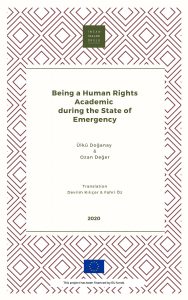Being a Human Rights Academic during the State of Emergency
Being a Human Rights Academic during the State of Emergency
Ülkü Doğanay & Ozan Değer
Translation: Devrim Kılıçer & Fahri Öz

Executive Summary
- The report has been written to outline the findings of the fieldwork launched within the framework of the project Bringing Human Rights Academy to Society funded by European Instrument for Democracy & Human Rights (EIDHR) and conducted by the Capacity Development Association in order to reveal the effects of State of Emergency in Turkey on human rights academy.
- The aim of this study is to reveal the kind of impact that the state of emergency (SoE), which was in effect between 21 July 2016 and 19 June 2018, had on academic studies in the field of human rights in Turkey and the kinds of consequences that the pressures had on the field.
- The research was carried out in the second half of 2018 and the first half of 2019.
- Within the scope of the research, 103 face-to-face surveys and 20 semi-structured in-depth interviews conducted with 79 faculty and 44 graduate students studying in the fields of human rights at public and private universities with human rights centres located in Ankara, İstanbul, İzmir, Diyarbakır and Konya provinces.
- The scholars working in various departments notably at faculties of law and those who had conducted or have been conducting studies and research on human rights at the faculties of economics and administrative sciences, faculties of humanities and faculties of communication etc. were included in the sample.
- The main conclusion drawn from the field research is that academic freedoms suffered significant damages during and after the SoE.
Other findings of the research can be listed as follows:
- Although it may be claimed that academics experienced the SoE in different ways depending on the university and their subject of study, the worries about the academics’ employment security and the protection of their personal rights have become stronger than usual.
- A wide majority of the academics participating in the research stated that they felt threatened during the SoE due to their work in the field of human rights or expressing their opinions.
- The atmosphere of fear created through dismissals, investigations, detentions and arrests and lynching campaigns, affected negatively both the human rights academia working on subjects which the government naturally “dislikes”, as well as lecturers and students, making them unable to do their jobs for different reasons.
- The “isolation” of academics who were expelled from the university and of those who continued work at universities caused their loss of belief in their work. For academics who continue their duties at universities, dismissals of their colleagues mean not only the increase in workload but also the “isolation”. This loneliness had important effects especially for academic studies in risky areas and triggered a kind of spiral of silence for some critical issues that are considered “objectionable” in the field of human rights.
- The anxiety of being notified by students and colleagues, the concern that the lessons might be watched secretly by the inspectors or intelligence staff damaged the bond of trust between academics and students.
- One of the most obvious effects of SoE on academic freedoms is that it has increased self-censorship; it forced academics to practice partially or completely in self-censorship in their courses, studies, theses and publications.
- In addition, owing to these restrictions academic fields of study narrowed down and many topics related to human rights were left out of the academic agenda due to the issues that are considered “objectionable”. As a result, the studies on the Kurdish issue, the Armenian issue, and LGBTI + rights entered among the topics making academics feel vulnerable to oppression and threat.
- Academics who carried out studies in the field of human rights or related to this field were also affected by the dismissals during the SoE; therefore, many courses requiring specialist knowledge were deprived of lecturers, and many theses went without supervisors. This also resulted in a shrinking of the research areas.
- The fact that research and publications on “objectionable” issues cannot be made, theses cannot be written, and many issues cannot be discussed in universities has led some of the academics to work on subjects that seem less risky.